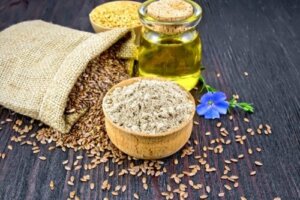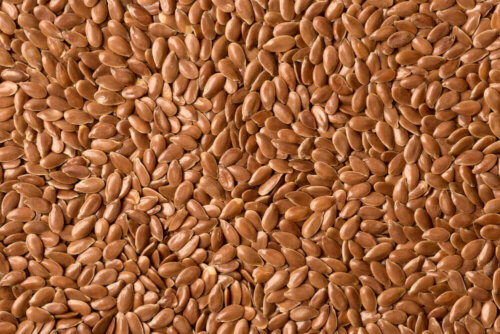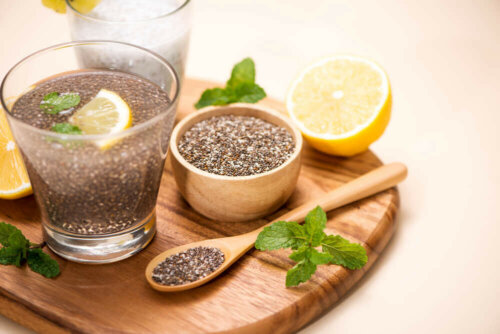Remove Colon Toxins with Flaxseed

In recent years, flaxseed has become very popular because it’s been shown that it can provide health benefits due to its content of antioxidants, omega-3 fatty acids, and various nutrients. However, many of these benefits also have to do with its fiber content which helps remove colon toxins.
It contains 40% of dietary fiber, one-third of which is soluble and the rest is insoluble. Soluble fiber becomes a gelatinous substance that absorbs toxins and fights constipation by loosening stools. Therefore, flaxseed consumption is considered excellent support for colon cleansing and restoration of bowel function.
The benefits of flaxseed to remove colon toxins

As you can guess, consuming flaxseed ─within a balanced diet─ can be one of your best allies for the intestinal microbiota, as it’s a good source of fiber and fatty acids. They also have laxative properties, which are good for combating constipation and improving intestinal function.
Constipation is a health problem that can cause many complications to those who suffer from it, because the person can’t defecate properly despite their efforts and, as a result, accumulates a large amount of waste in their body that can lead to other serious health problems.
The properties of flaxseed also help those who suffer from irritable bowel syndrome (IBS), as they reduce its symptoms and prevent it from being a daily nuisance.
Try these Nine Foods to Eliminate Abdominal Fat
How to remove colon toxins with flaxseed
To take advantage of all the benefits of flaxseed, it’s very important to make sure to get quality flaxseed. Keep in mind it’s important that the flaxseeds have been ground with all and its shell, which thus will have a greater amount of both soluble and insoluble fiber. In turn, this will facilitate colon cleansing.
Once you have a good flaxseed meal, you can try taking two tablespoons daily. To do this, you can let them soak for a couple of hours and then dissolve them in half a glass of water, or a cup of herbal tea, or a glass of fruit juice.
If you don’t like the texture of the flour, you can choose to eat the seeds directly; unroasted seeds are a good option, but if you prefer, you can eat them plain with some natural yogurt (without sugar) and a piece of fruit.
Mayo Clinic experts warn, “Most nutrition experts recommend ground flaxseed over whole flaxseed because the ground form is easier to digest. Whole flaxseed can pass through the intestine undigested, which means you won’t reap all the benefits.”
Get to know the Top Five Fruits for a Colon Cleanse
Duration of this treatment
Supposedly, the duration of this “treatment” to remove colon toxins with flaxseed is indefinite. Moreover, it depends on the situation of each person. First of all, the state of inflammation of the colon and the number of toxins it may have accumulated should be taken into account.
When you notice results, you can temporarily stop taking the flaxseed and start taking it again at a later date. However, there’s no problem if you continue to consume it as a healthy daily habit.
Things to keep in mind to remove colon toxins

Remember that this natural treatment can be very effective as long as you keep a healthy lifestyle and follow your family doctor’s instructions. Flaxseed alone won’t eliminate any health problems or reduce the risk of constipation. You must learn to adapt and maintain consistent habits.
Eat more fiber-rich foods such as whole grains, fruits, and vegetables. Also, try to modify your diet and eliminate those foods that may be harmful to your body.
It’s important you try to stay well hydrated on a daily basis to avoid health problems of all kinds. These include those capable of affecting the intestinal microbiota. For this, water will always be your best friend.
All cited sources were thoroughly reviewed by our team to ensure their quality, reliability, currency, and validity. The bibliography of this article was considered reliable and of academic or scientific accuracy.
- Guzel-Seydim, Z. B., Kok-Tas, T., Greene, A. K., & Seydim, A. C. (2011). Review: Functional properties of kefir. Critical Reviews in Food Science and Nutrition.
- Leite, A. M. de O., Miguel, M. A. L., Peixoto, R. S., Rosado, A. S., Silva, J. T., & Paschoalin, V. M. F. (2013, January 1). Microbiological, technological and therapeutic properties of kefir: A natural probiotic beverage. Brazilian Journal of Microbiology. Sociedade Brasileira de Microbiologia.
- Shim, Y. Y., Gui, B., Arnison, P. G., Wang, Y., & Reaney, M. J. T. (2014). Flaxseed (Linum usitatissimum L.) bioactive compounds and peptide nomenclature: Areview. Trends in Food Science and Technology. Elsevier Ltd.
This text is provided for informational purposes only and does not replace consultation with a professional. If in doubt, consult your specialist.








